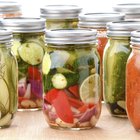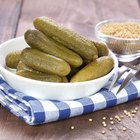GooDween123/iStock/GettyImages
Canning allows you to store your homemade pickles at room temperature, but unlike many other home-canned goods, they have a relatively short shelf life. Whether you make fermented or vinegar-based pickles, the high acid content of pickles makes them safe for canning, allowing you to put up some of the harvest for later. Don't gauge safety by time alone, the seal on the jar, the smell and the consistency of the pickle are also indicators that your pickles are still good to eat.
Canned Pickles Shelf Life
While many canned pickles retain quality for up to a year, for the best results in terms of texture and firmness, eat your canned pickles within six months of canning. Storing your pickles optimally in a cool, dry location helps to prevent spoilage and the premature deterioration of your canned pickles. Most fresh canned pickle recipes state not to eat the pickles for a specified amount of time after canning, generally around four weeks. Aside from this initial set-up period, pickles do not get better with age and you should plan on finishing them before a year is up to really enjoy them.
Canned Pickle Storage
For the best results in the longevity of your canned pickles, it is important to remember some simple storage basics that hold true for all canned goods. Store canned pickles in a cool area where they are protected from the light. Try to store them in an unheated room, basement or cellar to extend their shelf life. While improper storage does not necessarily make them unsafe to eat, it adversely affects quality and can quickly turn your pickles quite soft.
Canned Pickles Processing
Follow a tested recipe as well as proper water-bath canning procedures when canning your pickles to minimize your chances of spoilage in your finished homemade canned pickles. Many out-of-date recipes call for using the open-kettle method of processing to seal your jars; this method is no longer recommended by the U.S. Department of Agriculture and should be avoided. If you plan on pasteurization to process your jars, ensure that your temperature remains constant throughout the process by using a kitchen thermometer.
Canned Pickle Safety
Because of the acid content in both fermented and vinegar-based pickles, toxic botulism growth is quite rare. However, there are other issues that can signal spoilage. Any pickles that are mushy or slippery are not suitable for consumption and should be discarded. If your canning lids have become loose and have no seal, the pickles should also be discarded, as well as if you detect any off-odors upon opening the jar. As true with all canned goods, when in doubt, throw it out.
Related Articles
Do You Need to Pasteurize When Pickling ...
How Long Can Food Stored in Canning ...

How to Vacuum Seal Jars
How to Preserve Salsa Made With Canned ...

How to Can Green Tomatoes & Peppers ...

How to Can Salmon Fish

How Long Can Fresh Salsa Be Left Out?

How Long Is Sauerkraut Good to Eat if ...
Do Sardines Ever Go Bad?

Can You Freeze Canned Goods?

How to Preserve Sauerkraut

How to Keep Croissants Fresh Overnight

Why Did My Pickles Turn Cloudy?
Can You Freeze Capers?

The Advantages of Pickling Foods

How to Make Pickled Asparagus

Problems With Black on Canning Jar Rim

How to Make Blueberry Jam
Why Do We Soak Cucumbers in Water ...
How Long Are Canned Meat & Vegetables ...
References
- The Joy of Pickling; Linda Ziedrich
Writer Bio
Based in Portland, Ore., Maxine Wallace is a writer with more than 12 years of experience. With a bachelor's degree in journalism and experience working on marketing campaigns for large media agencies, she is well-versed in multiple industries including the Internet, cooking, gardening, health, fitness, travel and holistic living.